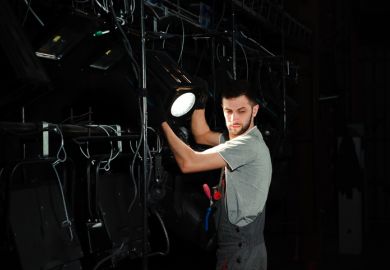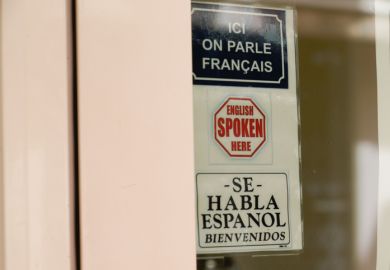The new director of the University of London’s Institute of Modern Languages Research sees stronger international links and public engagement as keys to combating the continuing crisis in her discipline.
The IMLR is funded by the Higher Education Funding Council for England to “promote and facilitate research” in modern languages. Catherine Davies took over as director on a four-year secondment from the University of Nottingham, where she serves as professor of Hispanic and Latin American studies.
She said she was “very angry” about the decline of modern languages within higher education, and the lack of “succession planning” to maintain the research base.
“It’s not just a natural phenomenon,” she explained. “It’s to do with political decisions, with vice-chancellors’ decisions. Languages are not compulsory in schools, so most of the people doing languages come from the private sector – that’s cutting off the vast majority of our population.”
It is part of the IMLR’s mission, in Professor Davies’ view, “to try and reverse the decline. We’ve seen it done in Classics as well as in the sciences. There is good evidence that arts students don’t really cost universities £9,000 a year [to teach], but the surplus always seems to go elsewhere.”
She called on vice-chancellors “not to be always thinking of the money” but to introduce policies similar to the one adopted by University College London, which requires students to take a language half-course during their first year if they do not already have a C-grade GCSE in a foreign language. Her own career has given Professor Davies some other pointers as to how modern language researchers can raise their profiles and secure their future.
She started with a PhD at the University of Glasgow on a writer called Rosalia de Castro, “the equivalent of Robbie Burns” in the Galician region of Spain. This led to a book, “the first study of de Castro in her social and political context”, which was published in Spanish but not in English, and made her pretty well known in Galicia. Her other writings in Spanish have attracted interest well beyond academic specialists, “from teachers, people who work in museums, professional women”.
A recent visit to a Mexican bookshop reminded Professor Davies how much of the history of that country, to take just one example, is produced by people working in British universities. “A lot of our researchers who are unknown here are very famous in the countries they write about,” she said. “It would be good to make people aware of that.”
Equally crucial is public engagement. Professor Davies was principal investigator on the first research project, funded by the Arts and Humanities Research Council, to look at “gender and women’s participation in the Latin American independence wars of the early 19th century”. This led to contacts with the Latin American Women’s Rights Service and, since many of the people involved “didn’t know about the role of women in the independence period”, to both a girls’ drama project and a photographic exhibition. There was also an exhibition in City Hall earlier this year about the London Latin American community.
“You start off with a research project,” reflected Professor Davies, “and you get working with the idea of ‘women and independence’ or the Latin American community in London – it’s all part of the impact agenda.”
Register to continue
Why register?
- Registration is free and only takes a moment
- Once registered, you can read 3 articles a month
- Sign up for our newsletter
Subscribe
Or subscribe for unlimited access to:
- Unlimited access to news, views, insights & reviews
- Digital editions
- Digital access to THE’s university and college rankings analysis
Already registered or a current subscriber?





